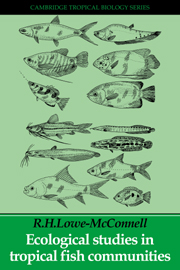Summary
This book, like its predecessor Fish Communities in Tropical Freshwaters (Lowe–McConnell, 1975), is based on field studies over a long series of years in many parts of the tropics, born of the delight of watching fishes in their natural environments. In such a book it is not possible to describe all the warmth and the colour, the sounds and the smells, the bird calls along the rivers, the glancing light – the many facets that make up the environmental whole. Yet often it is just the glancing light that gives a fish away, a ripple on the water surface, a shadow on the stream floor, leading predator to prey, woven into the complex pattern.
Why study tropical fish communities? Apart from the sheer pleasure of watching the behaviour of colourful fishes in clear warm waters of coral seas and freshwaters which provide natural aquaria, fishes are very important sources of protein in the diets of indigenous peoples throughout the tropics. Human populations are increasing at such an alarming rate that there is great pressure to develop fishery resources. It is vitally important that fish stocks should not be damaged by overexploitation and to avoid this we need to understand the biology of the fishes and factors governing fish production.
- Type
- Chapter
- Information
- Ecological Studies in Tropical Fish Communities , pp. xi - xiiPublisher: Cambridge University PressPrint publication year: 1987



